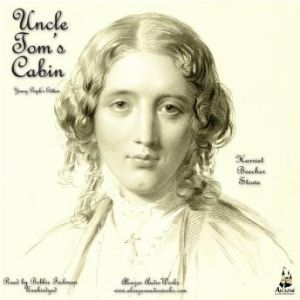

Uncle Tom's Cabin
Young Folks Edition
Author: Harriet Beecher Stowe
Narrator: Bobbie Frohman
Unabridged: 1 hr 42 min
Format: Digital Audiobook Download
Publisher: Alcazar AudioWorks
Published: 02/20/2014


Author: Harriet Beecher Stowe
Narrator: Bobbie Frohman
Unabridged: 1 hr 42 min
Format: Digital Audiobook Download
Publisher: Alcazar AudioWorks
Published: 02/20/2014
Harriet Beecher Stowe was born on June 14, 1811, in Litchfield, Connecticut, to Lyman Beecher, a Calvinist preacher and activist in the antislavery movement, and Roxana Foote, a deeply religious woman who died when Stowe was four years old. Precocious and independent as a child, Stowe enrolled in the seminary run by her eldest sister, Catharine, where she received a traditionally "male" education. At the age of twenty-one, she moved to Cincinnati, Ohio, to join her father, who had become the president of Lane Theological Seminary, and in 1836, she married Calvin Ellis Stowe, a professor at the seminary and an ardent critic of slavery. The Stowes supported the Underground Railroad and housed several fugitive slaves in their home. They eventually moved to Brunswick, Maine, where Calvin taught at Bowdoin College. In 1850, Congress passed the Fugitive Slave Law, prohibiting assistance to fugitives. Stowe was moved to present her objections on paper, and in June 1851, the first installment of Uncle Tom's Cabin appeared in the antislavery journal National Era. The forty-year-old mother of seven children sparked a national debate and, as Abraham Lincoln is said to have noted, a war. Uncle Tom's Cabin met with mixed reviews when it appeared in book form in 1852, but it soon became an international bestseller. Some critics dismissed it as abolitionist propaganda, while others hailed it as a masterpiece. The great Russian novelist Leo Tolstoy praised Uncle Tom's Cabin as "flowing from love of God and man." Stowe presented her sources to substantiate her claims in A Key to Uncle Tom's Cabin: Presenting the Original Facts and Documents Upon Which It Is Based, published in 1853. Another antislavery novel, Dred: A Tale of the Great Dismal Swamp, appeared in 1856 but was received with neither the notoriety nor the success of Uncle Tom's Cabin. Stowe fueled another controversy in The True Story of Lady Byron's Life, in which she accused the poet Lord Byron of having an incestuous love affair with his half sister, Lady Byron. She also took up the topic of domestic culture in works that include The New Housekeeper's Manual, written with her sister Catharine. Stowe died on July 1, 1896, at the age of eighty-five, in Hartford, Connecticut.
Bobbie Frohman, a third generation Californian, was raised in a large extended family, the niece of cowboys. Early on she developed a deep love of animals, training her dogs to perform with her at dog shows, and as a competitive barrel racer with her beloved horse, Lucky.
This book is one of the most moving, provocative pieces of literature I've ever read, and it's the first time that I can recall being moved to tears from a book. As long as I live, I will never be able to remove from my mind the vision of Eliza, panicked and frenzied, in the dead of the night with h......more
“One of the greatest productions of the human mind.”
Leo Tolstoy“[Beecher Stowe has] baptized with holy fire myriads who before cared nothing for the bleeding slave.”
Frederick Douglass“Harriet Beecher Stowe’s Uncle Tom’s Cabin…demonstrates that one can write something that changes the world and makes it a better place. She reinforces the concept that the root of evil is the abuse of power, and it is important for all of us to remember that. It’s why people bully. It’s why they rape, torture, and murder.”
Patricia Cornwell, #1 New York Times bestselling author“Belongs to the very short list of American books that helped create or consolidate a reform movement.”
New York Times“To expose oneself in maturity to Uncle Tom’s Cabin may…prove a startling experience.”
Edmund Wilson, New York Times bestselling author“Uncle Tom’s Cabin is the most powerful and enduring work of art ever written about American slavery.”
Alfred Kazin, American writer and award-winning literary critic